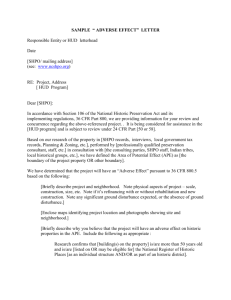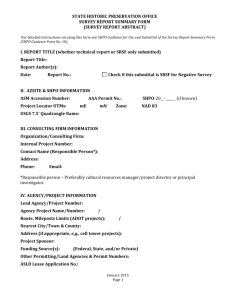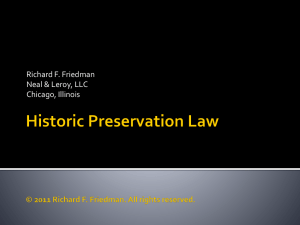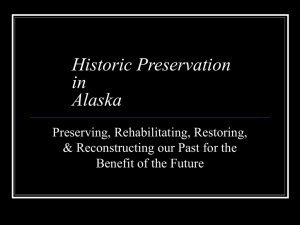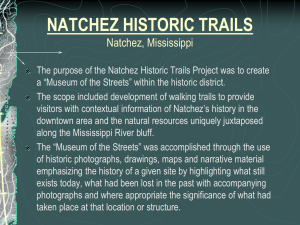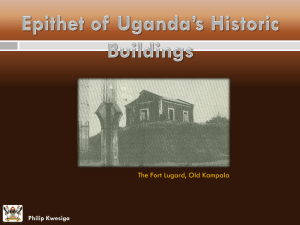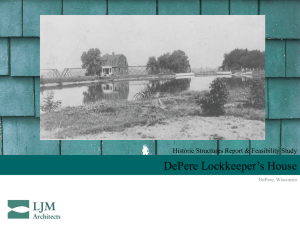Mary Ann Heidemann, State Historic Preservation Office
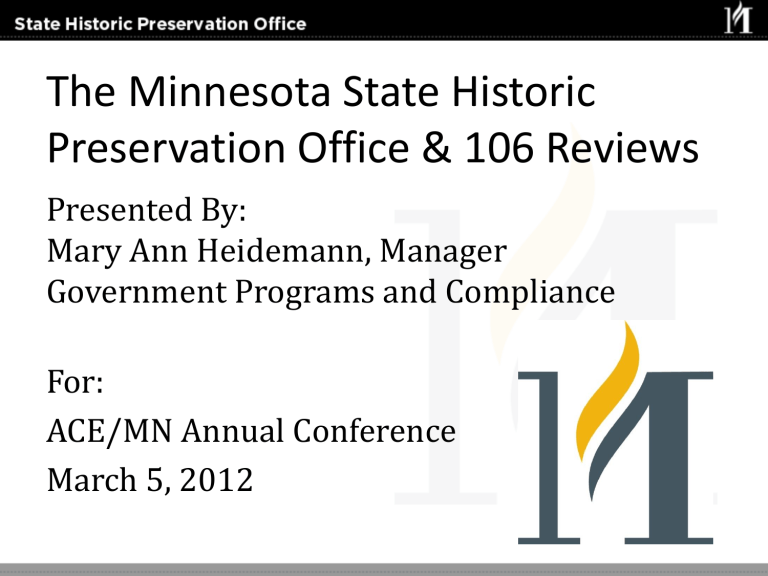
The Minnesota State Historic
Preservation Office & 106 Reviews
Presented By:
Mary Ann Heidemann, Manager
Government Programs and Compliance
For:
ACE/MN Annual Conference
March 5, 2012
Establishment of SHPO
• SHPO authorized in Sec.
101 of the National
Historic Preservation
Act, passed in 1966
• Minnesota SHPO established in 1968
• SHPO appointed by each
State’s Governor
• Federal Act sets minimum program requirements
6
Duties of the SHPO Under
The National Historic Preservation Act
• Conduct a comprehensive state-wide survey of historic resources
• Assist local units & state agencies with historic preservation
• Nominate properties to the National Register
• Create & implement the
State Preservation Plan
• Administer State program of Federal preservation incentive programs
• Consult with Federal agencies about impact of
Federal projects on historic resources
• Provide public information, education, training and technical assistance
Intended Audiences
• Owners of historic properties
• Local government units
• State agencies
• Federal agencies
• Tribes
• Preservation groups
• Preservation professionals
• The public
Participation in SHPO/THPO Programs
• All 50 States
• Eight US Territories
• Washington DC
• Native American Tribes
• MN has 9 THPOs currently (out of 11 recognized tribes)
MN SHPO Organizational Structure & Location
• SHPO is located in MN
Historical Society (MHS)
• MN Legislature named head of MHS as State
Historic Pres. Officer
• Government function inside a private, nonprofit institution
• SHPO offices located in
History Center, in downtown St. Paul
SHPO Director and Staff in MN
• Steve Elliott Heads MN
Historical Society and Serves as the MN SHPO
• Barbara Howard is Deputy
SHPO & Department Head
• SHPO has 18 staff persons in four areas
– Administration: 2
– Outreach & Grants: 7
– Register & Incentives: 4
– Compliance: 5
• Many state/federal agencies employ in-house historians & archaeologists (ie: MnDOT)
MN SHPO
Organizational
Chart
MN SHPO Staff
SHPO Programs in Minnesota
• National Register
• Federal Tax Credits
• State Tax Credits
• MN Legacy Grants
• MN Main Street Prog.
• Sec. 106 Reviews
• Assist Local Heritage
Preservation Comm.
• Keep Historic Site &
Survey Records
• Create Preservation Plan
Sec. 106 review per 36 CFR Part 800
Programmatic Agreement between FHWA, SHPO &
MnDOT Internalizes Transportation Review
• MnDOT’s Cultural Resources Unit
(CRU) represents FHWA
• CRU reviews FHWA projects for potential affects on historic properties
• Projects with no historic properties move forward
• Projects historic properties but no effect move forward
• Projects that may affect historic properties go to SHPO
“Reasonable Effort” is required by regs to identify historic properties. This means a survey.
Survey Requirements:
Cover both structures & archaeological sites
Identify known sites
Conduct Phase I Survey to discover any new sites
Evaluate Register eligibility of new sites
If site is Register eligible, evaluate effect of project on the historic property
Compliance Unit Sec. 106 Review Process
Applies to projects receiving federal funds or permits that have the potential to effect historic sites. In FY 2010, 5006 new review packets were received.
Project Receipt & Screening
• Hard copy submittals only
• Date stamped & logged in
• Map & file of project area
& known sites created
• Projects with no effect on historic properties get quick turn-around
• Projects in or near known sites are reviewed further
• Distributed internally
Distribution for Comments
• Sent to appropriate staff
– Archaeologist
– Architectural Historian
– Architect
• Twice monthly triage
• Experts make comments
• Compliance Unit compiles response within 30 days
• Complex projects may require series of responses
SHPO Submittal Content
Don’t assume we understand the project as well as you do!
• Describe undertaking
• Funding & permits
• Project location map
• Area of Potential Effect
• Ground to be disturbed
• Building/site photos
• Available plans/designs
• Public participation info
Check with SHPO for Known Sites
Site Data Base Includes:
• Historical and
Architectural Sites
• Archaeological Sites
• Regulatory Status of Sites:
– Listed in National Register
– Certified as eligible
– Staff finding as eligible
• Location of sites (T,R, Sec)
• State Register sites listed in MN Historic Sites Act
Access to Site Data
• Mapped on SHPO topos
• Known sites also have a file
• Maps and files open to public Tues-Fri, 8:30-4:00
• Or send data base query to: thomas.cinadr@mnhs.org
requesting known sites in each geo section of interest
• Queries run once a week
If Historic Properties are Present or Suspected
Within the APE, SHPO Concerns Can Include:
• Archaeological site disturbance
• Adverse building or site impact
• Additions or alterations
• Severing property
• Adverse site modifications
• Changes in key site features
• Change of setting & function
• Visual effects
• Noise, vibration & traffic
• Historic Dist. business impacts
Resolution of Adverse Effects
Typical Hot Buttons:
• Near water (archaeology)
• CCC/WPA structures
• Mid-century modern designs
• Construction impacts
• Visual or noise effects on nearby historic sites
• Avoid
– Find known sites
– Change plans
• Minimize
– Compatible designs
• Mitigate
– Negotiate an MOA
– Agree on stipulations

